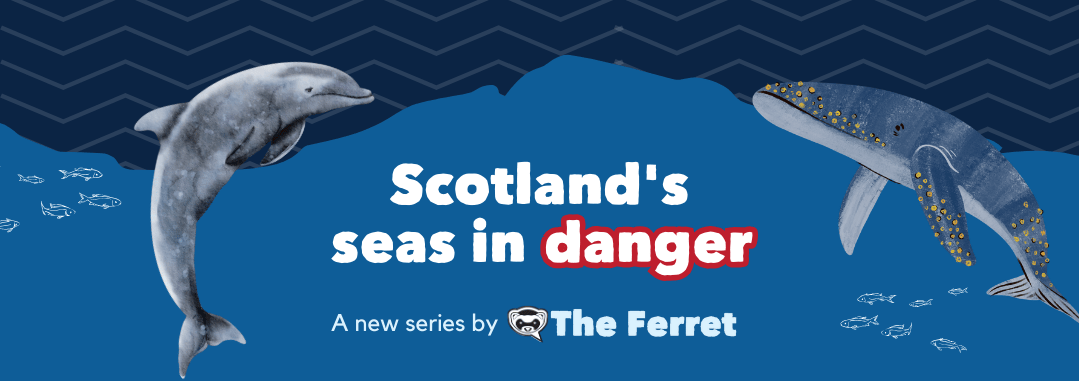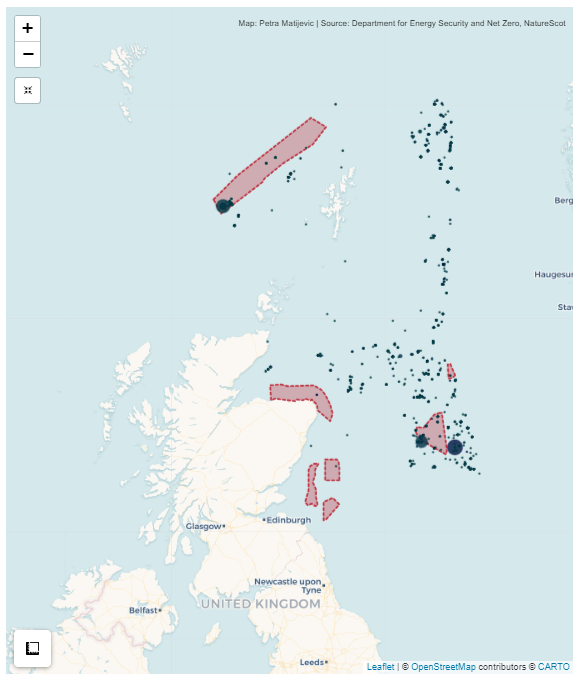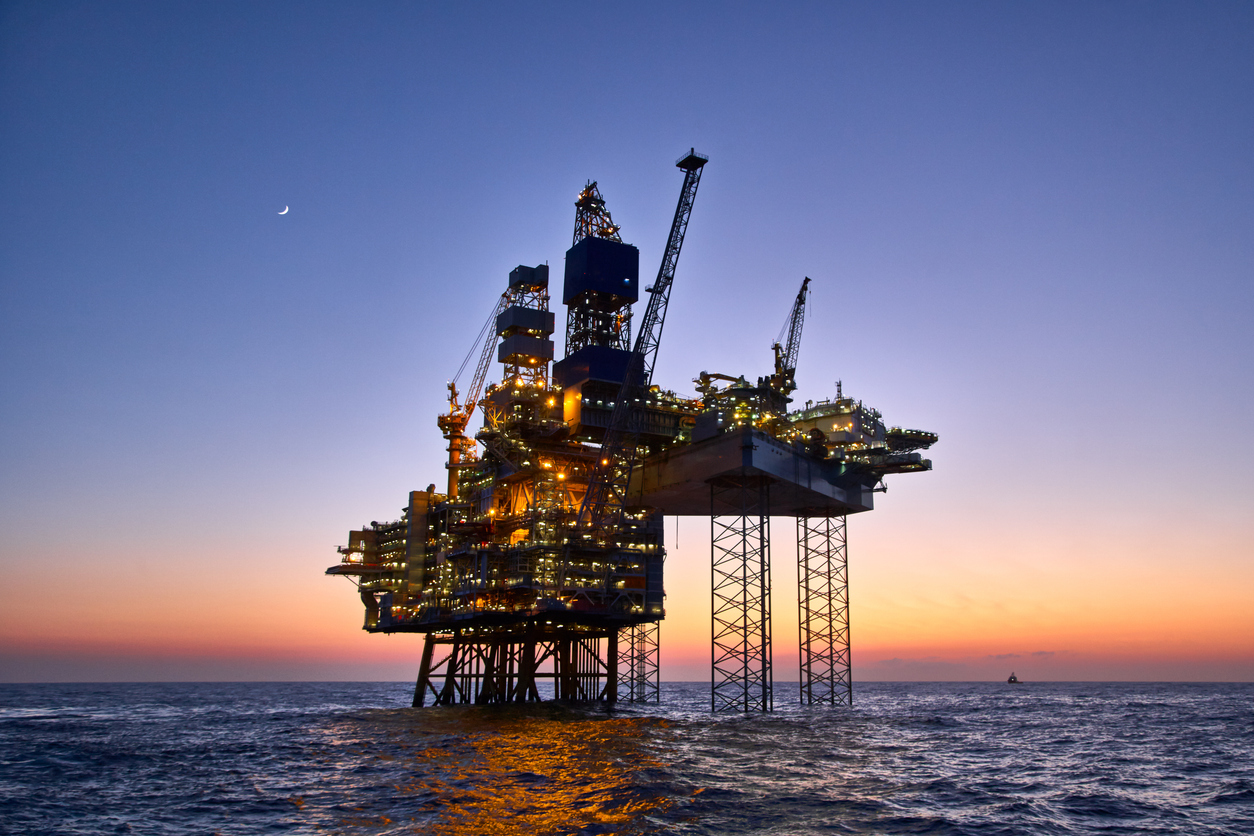There have been more than 2,000 oil spills in the North Sea since 2011 including 215 in marine protection areas home to some of Scotland’s most threatened species and habitats, The Ferret can reveal.
Our analysis of official UK Government data on oil and gas spills found that 1,175 tonnes were spilled between January 2011 and December 2023 – 2,252 spills in total.
Some 308 tonnes of oil spilled into marine protected areas (MPAs) over the 13-year period. Green groups stressed that marine life is put at risk by spills, as well as toxic chemicals, microplastics, and seismic blasting noise pollution from oil and gas production.
Exposure to toxic oil fumes has been recognised to kill whales and dolphins years after exposure, according to the Centre for Biological Diversity.
Nearly all the spilled oil – 97 per cent – came from oil rigs, while the remainder was spilled from mobile rigs, pipelines and vessels.
The Ferret’s investigation is part of a special series called Scotland’s Seas in Danger, and it follows the UK Government’s controversial plans to authorise hundreds of new oil and gas licences in the North Sea.

Environmental campaigners said our findings showed the scale of “chronic oiling” of the North Sea by the fossil fuel industry. Greenpeace said drilling for oil can “devastate marine ecosystems”, yet the UK Government is “greenlighting a new North Sea drilling frenzy – including in – that will further imperil ocean life and worsen the climate crisis”.
In reply, the UK Government said it has an extensive framework of environmental protection measures in place to deal with spills. A trade body for the oil and gas industry said companies have “comprehensive oil spill response plans in place to mitigate against potential incidents occurring and minimise the impact should they occur”.
The Ferret analysed the data on unplanned hydrocarbon releases at North Sea oil and gas facilities, which were reported to the Offshore Petroleum Regulator for Environment and Decommissioning (OPRED).
Offshore oil and gas operators in UK waters must report all accidental releases of oil or chemicals to OPRED within six hours, regardless of the volume of the spill. They use the Petroleum Operations Notice 1 (PON1) reporting system.
Click on the spill circles to see information about the spilled quantity, cause for release and the companies responsible. Use the measuring tool to select two points on the map and measure the distance of the spill from the shore. Zoom in and use the measuring tool to measure the diameter of the spill.

Sizes are illustrative and assume a product density of 900 kg/m3 and a spill thickness of 1 µm (one thousandth of a millimetre). Oil and oil products can have different densities. Actual thickness of spills varies and depends on the substance, wind conditions and time on water.
The vast majority of incidents – 99 per cent – were below two tonnes and averaged two kilograms. Spilled liquids include crude oil, diesel, condensate, hydraulic oil, and lube oil. Most spills included oil and liquid gas – 125 tonnes worth.
Their causes include spills while filling bunkering vessels, overfilling vessels, holes and ruptures in pipelines, valve, seal and pump failures, equipment failure, and subsea releases.
There have been 25 incidents since 2011 where more than two tonnes were spilled, releasing 1,051 tonnes of oil.
With a spill recorded every couple of days on average for the past decade it’s clear this industry can’t operate without causing serious harm.
Caroline Rance, Friends of the Earth Scotland
In 2012, 605 tonnes of natural-gas condensate was spilled at the Elgin field platform, operated by TotalEnergies.
The second worst spill in Scottish Seas was in 2020 when 238 tonnes of diesel was spilled into the Faroe-Shetland Sponge Belt MPA.
There have been 215 spills into MPAs since 2011, totalling 308 tonnes of oil. Some 116 spills were reported in the Faroe-Shetland Sponge Belt and 93 in East of Gannet and Montrose Fields – a habitat for the ocean quahog clam, which is native to the North Sea and lives up to 400 years.
In 2011, two spills released 580kg of liquid gas into waters nine miles off the coast of Fraserburgh. The area was designated as the Southern Trench MPA in 2020 and is a breeding ground for the minke whale, a protected species.
BP, Shell and TotalEnergies operated the wells and vessels that spilled the most. They collectively accounted for 82 per cent of spills in terms of quantity and 42 per cent by number of spills.
The spills in the three most “leaky” fields – Elgin (operated by TotalEnergies), Foinaven (BP) and Gannet F (Shell) – were all in, or in close vicinity, of the MPAs. Of all spilled oil in the Scottish North Sea, 79 per cent came from one of these three fields.
Both the number of spills and the quantity of leaked substances have decreased over the years, with an average of 200 spills per year between 2011 and 2019, compared to 112 spills per year since 2020.
In January, the UK Government gave 17 oil companies the right to drill for fossil fuels in 24 new licence areas across the North Sea. These followed an initial tranche of 27 licences offered in October last year. The licences were granted in the Central North Sea, Northern North Sea and West of Shetland areas.
Firms could begin producing oil and gas before the end of the decade, the North Sea Transition Authority said.
According to the Scottish Government’s 2020 Marine Assessment, even small oil spills can have an environmental impact if they happen in conservation areas.
Green groups condemn spills
Philip Evans, Campaigner at Greenpeace UK, claimed that The Ferret’s findings “proves many of the UK’s marine reserves are paper parks protected in name only, where fossil fuel giants like Shell drill – and spill – to their hearts’ content”.
He added: “Drilling for oil at sea can devastate marine ecosystems, but the government is greenlighting a new North Sea drilling frenzy – including in – that will further imperil ocean life and worsen the climate crisis while doing nothing to lower our energy bills or boost our energy security.”
Naomi Tilly, campaign lead at Oceana UK, said: “While catastrophic oil spills grab headlines – as they should – the less well-known ‘chronic oiling’ of UK seas has an insidious impact, creating an almost constant hazard for ocean wildlife.
“Sea birds are especially vulnerable, for instance, as the oil strips them of the ability to stay warm, dry and afloat. Even if they escape hypothermia or drowning, oiled feathers make flight more tiring, which on a migration can be the difference between life and death.”
She added: “Of course it isn’t just sea birds, whales and dolphins that ingest the toxic oil as they come up for air – shellfish accumulate the contamination in their bodies, the list goes on. Yet our government continues to allow oil and gas developments to be sited within our marine ‘protected’ areas. This utter disregard for some of the UK’s most inspiring wildlife is not what the British people want or deserve.”
Mark Ruskell, Scottish Greens MSP, said that the “number, volume and location of these spills are extremely concerning”. He added: “We’ve all seen the damage even a single spill can do. To have so many, especially in close proximity to designed to protect vulnerable species and habitats, should ring alarm bells.
“While oil companies rake in billions, they seem to be taking safety for granted, putting our seas, their fragile ecosystems, and the communities that rely on them at risk. Government and regulators must ensure the proper precautions are in place and followed, and act swiftly where they aren’t.”
This utter disregard for some of the UK’s most inspiring wildlife is not what the British people want or deserve.
Naomi Tilly, Oceana UK
Caroline Rance, Friends of the Earth Scotland climate and energy campaigner, said: “With a spill recorded every couple of days on average for the past decade it’s clear this industry can’t operate without causing serious harm.”
She added: “The repeated damage to is totally unacceptable and these offenders must be taken to task to explain these incidents and put in place plans to stop it happening again in future. Oil will spill and gas will leak so any new oil and gas production will inevitably lead to further pollution of this type, in addition to the climate devastation it will bring.”
Mark Wilson, health, safety and environment operations director at Offshore Energies UK (OEUK), said the oil industry “recognises that there is no room for complacency when it comes to unintentional releases to sea”. He added: “The industry takes all such releases seriously, regardless of size or potential for harm and are focused on driving continuous improvement.
“The reporting of unintentional releases of oil is conducted in an open and transparent manner no matter how small the release. For context, the UK annually produces about 40-45 million tonnes of oil and up to 40 billion cubic metres of gas. This equates to just under half the UK’s demand for oil and gas.”
A spokesperson for the UK Government’s Department for Energy Security and Net Zero said it monitors offshore pollution incidents “closely” and investigates all reports of accidental releases. “If required, appropriate action will be taken, including the use of fines or referral for criminal prosecution,” the spokesperson added. “We have a comprehensive legal framework of environmental protection measures for offshore oil and gas activities, which covers all stages of the licensing and consenting process.”
BP and TotalEnergies have been asked to comment.
Shell referred The Ferret to OEUK for a comment.
Scotland’s Seas in Danger is a year-long investigative series by The Ferret that delves into Scotland’s marine environment. Our investigations were carried out with the support of Journalismfund Europe.

This project is was conducted in partnership with the Investigative Reporting Project Italy (IRPI), which will publish its work later this year.
If you like what we do and want to help us do more independent journalism, you can support us by becoming a member. You can also donate or subscribe to our free newsletter.
Main image: Igors Aleksejevs/iStock














